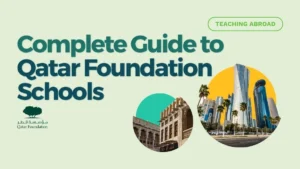In the vast landscape of international education, ESL academies (language schools) and international schools often get mistakenly lumped together.
However, it’s essential to understand that these two options are not interchangeable, as they exhibit distinct qualities and pursue different objectives. While both cater to speakers of other languages, they offer diverse approaches to education.
If you’re on your teaching journey, take a look at this comprehensive chart below to understand the differences between ESL academies and international schools, and make the best decision for your teaching journey abroad.
| ESL/Language Academies | International Schools | ||
| Working Environment: | Class Sizes and Age Groups | Typically small class sizes of 5-15 students. Student ages may range from preschool to adult learners. | Typically larger class sizes of 15-30 students. Student ages range from kindergarten to high school. |
| Subject Areas | ESL (English as a Second Language) or EFL (English as a Foreign Language). Possibly English test preparation classes or Business English. | Elementary classroom teacher or middle/high school subject areas, such as Social Studies, Art, History, Science, English Language Arts, Business, etc. | |
| Curriculum | Varies depending on school. | Predominantly American, British, and International Baccalaureate (IB) curricula. | |
| Working Hours | Typically 5 working days per week, but may be scheduled on weekends. Usual hours during the week are in the evenings; weekend hours could be during the day or evening. | Monday to Friday. Typical hours are 8:00am to 4:00pm including preparation periods. | |
| Benefits: | Holidays | Varies depending on the school, but approximately 10 business days per year (not including national holidays). | Holidays follow the school calendar with the exception of occasional professional development workshops. |
| Allowances | Varies depending on school, but may include: housing allowance and/or travel allowance. | Varies depending on school, but may include one or more of the following: housing allowance, travel allowance, settlement allowance, shipping allowance, professional development stipend. | |
| Salary | Varies depending on school and country. | Varies depending on school and country. Advanced degrees may entitle teacher to a higher step on the salary scale. | |
| Qualification: | TEFL certification is highly recommended. | Teaching license is required. |
Get started on your teaching journey abroad
Take the first step towards an exceptional educational experience. Enroll now and embark on a journey of growth and knowledge that will shape your future.



